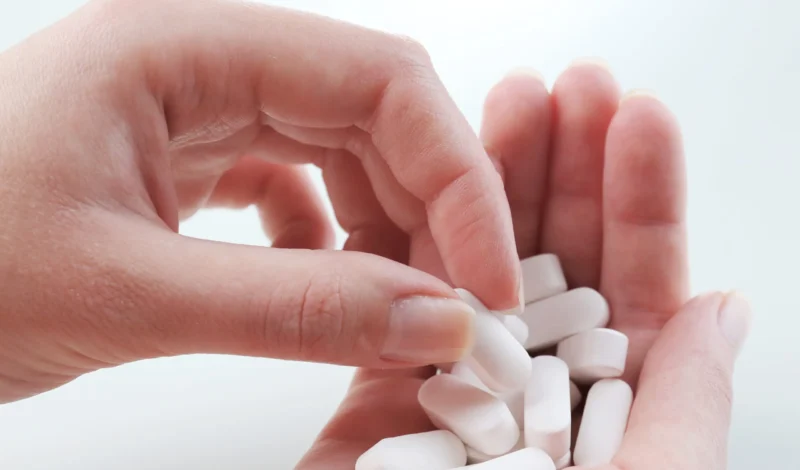Everybody suffers from a feeling of fullness - be it after a sumptuous family meal or when the appetite was [...]

Treat irritable bowel syndrome: These options are available
Cramps in the gastrointestinal tract, loss of appetite, diarrhoea – an irritable bowel syndrome manifests itself in many symptoms. As different as the symptoms can be, so individual is the treatment of an irritable bowel syndrome. For a successful therapy, it is important to make a founded diagnosis and to have a doctor examine you thoroughly. Part of such a diagnosis can be a stool examination in the laboratory.
Irritable bowel syndrome: Before treatment comes the diagnosis
In order to treat irritable bowel correctly, it is important that a doctor excludes all other typical intestinal diseases. These include chronic inflammatory bowel diseases such as Crohn’s disease and ulcerative colitis. For this it is essential that the doctor knows the symptoms present. Only then is it possible to treat the irritable bowel correctly.
For this reason, it makes sense to keep a nutrition diary in which all meals, snacks and drinks are recorded. If complaints occur after a meal, this must also be noted in the nutrition diary together with the time of occurrence. The same applies to the intensity of the symptoms. In addition, it makes sense to record phases of particular psychological stress in the diary.
A personal nutrition diary is so important because there is no standard treatment for irritable bowel syndrome. The symptoms of irritable bowel syndrome suffered by people affected can vary considerably in both type and intensity. Typical symptoms are for example:
- cramps in stomach and intestines
- constipation
- diarrhoea
- bloating
- nausea
- vomiting
- heartburn
In addition to keeping a nutrition diary, examinations of the blood, stool, ultrasound or a gastroscopy and/or colonoscopy are necessary for an accurate diagnosis. Irritable bowel syndrome can occur at any stage of life, both at an early age and at an advanced age.
In principle, the human digestive system requires certain bacteria for its functions. Bacteria are therefore by no means always harmful to health, but are enormously important for the digestive tract. However, it depends on the type of bacteria: If the proportion of harmful intestinal bacteria predominates, the intestinal equilibrium gets disturbed. Further causes for inflammations or an irritation of the intestine can be a genetic preloading, various environmental factors as well as a weakened immune system.
Which therapy makes sense for irritable bowel syndrome?
There are several therapeutic approaches that can be used to treat irritable bowel syndrome. However, it is not possible to heal an irritable bowel yet. The aim of the treatment is therefore to alleviate the symptoms or prevent their occurrence. In the case of acute symptoms, medication may be appropriate. In the long term, a change in diet and psychotherapy can bring success.
Spasmodic, muscle-relaxing medications relieve gastrointestinal cramps. So-called spasmolytics such as nifedipine, mebeverine or butylscopolamine are commonly used. At the same time, they have an analgesic effect. Who would like to counteract pain and cramps with natural means, should try peppermint and caraway oil. For diarrhoea, antidiarrhoea remedies such as Loperamid are used, for severe flatulence or bloating so-called defoamers such as Simeticon. Constipation can be counteracted by eating foods rich in fibre – for example psyllium seeds or linseed.In order to treat irritable bowel syndrome, a change in diet is advisable. The following nutritional rules can serve as orientation:
- Hot and strongly seasoned foods can irritate the stomach and intestines. Therefore, meals should only be mildly seasoned.
- Existing food intolerances must be considered in the diet.
- Avoid foods that cause flatulence such as cabbage and legumes.
- Carbonated beverages, alcohol and too much coffee can cause irritable bowel symptoms.
A temporary low FODMAP diet helps those affected identify food groups that cause discomfort. During the diet, probiotic bacteria cultures can make a positive contribution to general intestinal health. Their use in connection with intestinal inflammation has already shown promising results.
Alternative therapies for irritable bowel syndrome
In many cases stress increases the symptoms of irritable bowel syndrome. In this case a therapy should start at the cause and include measures for stress reduction. Relaxation techniques such as yoga, meditation, progressive muscle relaxation or autogenic training have proven helpful in treating irritable bowel syndrome. All these techniques can be performed with a little training and without instruction. Hypnosis, acupuncture or a reflex zone massage can also be useful as relaxation measures. A conversational or behavioural therapy can help those affected to deal better with conflicts and thus prevent the occurrence of stress-related irritable bowel complaints.
Examination of intestinal flora and treatment of irritable bowel syndrome
With INTEST.pro, the experts from BIOMES have developed an intestinal test that uses a tiny stool sample to show changes in the intestinal flora and thus in digestion. For the the test are used methods according to the latest scientific standards1 Among other things, they provide information about the immune strength, the calorie utilization, the proneness to food intolerances, the balance of intestinal bacteria and generally the digestion. The results are based on the findings of more than 7,000 scientific and clinical studies, with which an evaluation of the individual intestinal flora is possible – they are presented in detail and clearly in the personal online dashboard.
1. Cho I, Blaser M J. The human microbiome: at the interface of health and disease. Nature Reviews Genetics 2012:13, 260-270. https://www.nature.com/articles/nrg3182



